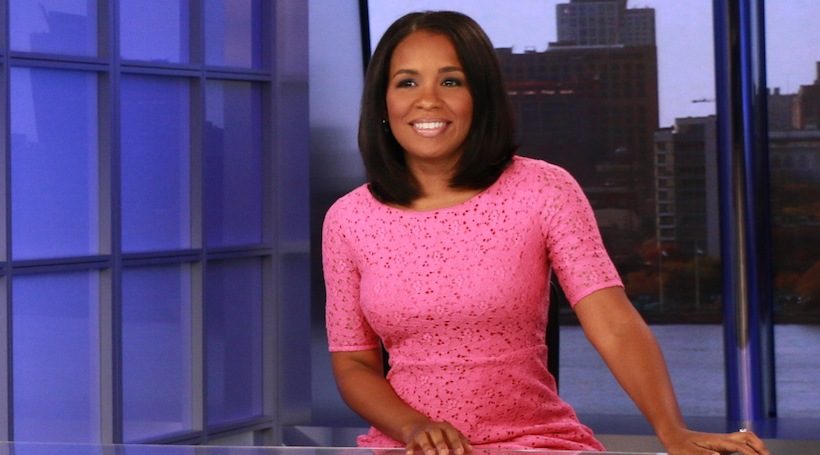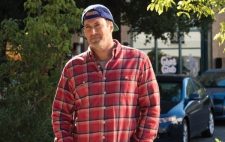NBC10’s newest 5 pm anchor Erin Coleman hails from Voorhees, but she’s bringing a world of experience to her new position. The SJ native has lived and worked in places like Arkansas and North Carolina, but after nearly 20 years covering the latest story, Coleman is South Jersey bound – and happy to be home.
Is there a story you’ve covered that you’ll never forget?
My favorite stories are community-based. Stories I feel otherwise might not get told, about people you might not otherwise know. Stories about people who are quietly doing amazing things in their community. Those are the stories that resonate with me, and they’re ones you remember.
One of my first stories was in Jonesboro, Ark., my first market. A woman called and said she got ripped off by a roofer. This woman was about 80 years old, and she was living in a house where you could see the dirt on the ground. The house was unlivable. It was covered in plastic, completely destroyed. She was still living in it, because she had nowhere else to go. It was one of the times early on in my career where – and I didn’t even realize it at the time – I could help this woman and make a difference. By the time we aired the story, people were calling the station saying, “I’m going to fix her floor.” Habitat for Humanity got involved. It resonated with me. These stories can make a difference, and you can change people’s lives.
Did anyone inspire you to become a journalist?
It’s sort of cliché, but Oprah did. She’s a fantastic storyteller, and she started in news in the Baltimore area. She’s also a great interviewer – that’s Oprah’s strength. She’s so good at asking the questions everybody wants you to ask. I’ve seen some thoughtful interviews; she really gets in there. She made me want to be a good interviewer and get at the heart of the story and ask the question that might make you or the interviewee uncomfortable. But you’ve got to ask those questions and get out of your comfort zone. When you’re trying to get at the truth, you’ve got to do that.
What are some of the biggest stories you’ve covered?
I covered the capture of Eric Rudolph, the Olympic Park Bomber. I went to the mountains of North Carolina when that whole thing was going down. I covered the Virginia Tech shooting. I covered the Iowa caucuses. My team and I won an Emmy and an Edward R. Murrow Award for a story on firefighter air packs. That was an impactful series of stories. Firefighters basically depend on these things to breathe when they’re in a burning building, going in to save your life, and they were failing. The firefighters were having to bail out of homes, because they couldn’t breathe. It’s black, it’s dark, and they’re inhaling smoke. I’ve also been to the coast through hurricanes. It runs the gamut, the kinds of stories I’ve covered.
What has changed in journalism since you began your career?
A lot of the change we’re seeing is due to technology. You can get information so much faster now. On the whole, it’s a positive change, because there’s greater access. But at the same time, you do have to be careful with all of this extra access. It’s a two-way street. There’s more information out there, but it’s not always accurate information. You have to be diligent. As journalists, we have to be more discerning, more on our game and clearly fact-check everything. Those are all things we were doing before, but it’s at a heightened level now.
Has social media influenced the way you do your job?
We use social media as a newsgathering tool. Social media allows you have to have your finger on the pulse of what’s going on in people’s communities and use that to gather news and shed light on an issue or a topic that you may not have considered otherwise. In that respect, it’s been good, but you can also get burned really easily, too. We’re also seeing more one-man bands: people who can shoot, write, edit. People who can go live just with one person; you don’t need a truck, a set operator, someone to hold the mic. One person can do it all by the themselves. Look at Facebook Live – we could go live from anywhere.
Do you think there has been an increase in people who mistrust the media?
I don’t think the majority of people distrust the media. I do think they’re exposed to many different viewpoints, which goes along with that greater access to technology, and that sometimes makes it difficult to reconcile those views. Because so much is coming at people from so many different angles, it may seem like there’s this inherent distrust of the media. As professionals in the industry, we have to keep doing our job putting the facts out there, front and center, in a way that’s easily digestible. Make it very clear that we’re playing it straight down the middle. I think that’s something the industry could be better at. We may have to do a little more of that, just say, “These are the facts, this happened, and then this happened,” and don’t leave room for interpretation. We could make it clearer that, “Hey, I’m not putting my own spin on it.”
How important is having someone trust you as a reporter/anchor?
Trust can be earned. Even though you may be coming from different backgrounds and you may not have grown up in the same place or look the same, you can understand somebody else’s situation. If people get that about you, if they think, “She wants to understand where I’m coming from. She wants to tell my story, and she can relate to me,” then you can earn that trust.
When did you first feel an attraction to journalism?
Growing up, we always sat around the kitchen table, we ate dinner and the news was on. Every night, we were watching the news. Every morning, my parents got the paper – they still do. News has always been a foundation in my family. The news was always there. I knew the people on the news, on all the stations, and I knew I liked being informed. As I got older, I liked telling stories. When I was going to college and trying to figure out my career path, I became a DJ in college. I did a little bit of community news on the radio, and that’s when I decided to go into journalism.
Where do you see yourself in five years?
My future is here, and I hope it’s a nice, long future. This is always where I’ve wanted to come. Several of my friends who I grew up with tell me I always said I wanted to come back. I don’t recall saying that, but it makes sense to me now. In journalism and broadcast, you bounce around a lot. You’re kind of always thinking about your next move. I’m not thinking about the next place this time. A lot of people don’t get to come home, so I realize I’m lucky, and I want to make the most of this opportunity.
What’s it like being back in South Jersey after 20 years?
A lot has changed! There’s a lot more people, a lot more buildings. The other day I asked about this one diner, and apparently it’s gone. Then I’m like, “What about such and such circle?” That circle is gone. In South Jersey, circles were everywhere!
My entire career has been in the South – in Arkansas and two stops in North Carolina – so being back is just…it’s totally different, and it’s great. It’s funny, on the news, I like hearing the forecast when they say the temperature in Voorhees, in Mount Laurel, in Burlington. I know exactly where they’re talking about. When I hear the traffic report and she’s talking about an accident on Route 70, I know exactly where that is. That’s totally different, because this is home.
Follow Erin Coleman on Twitter for more updates and info.














